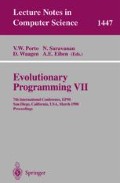Abstract
Previous work on host-parasite genetic algorithms consists of specific algorithms, applied to single example problems. We attempt to design a simple host-parasite genetic algorithm (SHPGA), with the aim of obtaining an algorithm with broad applicability to a wide range of problems. We argue that the benefits of the simplicity of SHPGA are twofold: i) it allows empirical analysis of the performance of the algorithm and comparison with the performance of a corresponding noncoevolutionary GA; and, ii) if performance benefits are found, we can fairly safely attribute them specifically to the use of host-parasite coevolution.
Preview
Unable to display preview. Download preview PDF.
References
R. Das, J.P. Crutchfield, M. Mitchell, and J.E. Hanson. Evolving globally synchronized cellular automata. In L. Eshelman, editor, Genetic Algorithms: Proceedings of the Sixth International Conference (ICGA95). Morgan Kaufmann, 1995.
D.B. Fogel. Evolutionary Computation: Toward a New Philosophy of Machine Intelligence. IEEE Press, 1995.
D.E. Goldberg. Genetic Algorithms in Search, Optimization, and Machine Learning. Addison-Wesley, 1989.
D.E. Goldberg and K. Deb. A comparative analysis of selection schemes used in genetic algorithms. In G.J.E. Rawlins, editor, Foundations of Genetic Algorithms, pages 69–93. Morgan Kaufmann, 1991.
D. Hillis. Co-evolving parasites improve simulated evolution as an optimization procedure. In C.G. Langton, C. Taylor, J.D. Farmer, and S. Rasmussen, editors, Artificial Life II, volume X of Sante Fe Institute Studies in the Sciences of Complexity, pages 313–324. Addison-Wesley, 1992.
John H. Holland. Adaptation in Natural and Artificial Systems. Univ. of Michigan Press, 1975.
J. Horn and D.E. Goldberg. Genetic algorithms, tournament selection and the effects of noise. Complex Systems, 9:193–212, 1996.
K.A. De Jong and M.A. Potter. Evolving complex structure via cooperative coevolution. In J.R. McDonnell, R.G. Reynolds, and D.B. Fogel, editors, Evolutionary Programming IV, Proceedings of the Fourth Annual Conference on Evolutionary Programming. MIT Press, 1995.
H. Juillé. Incremental co-evolution of organisms: A new approach for optimization and discovery of strategies. In F. Morán, A. Moreno, J.J. Morelo, and P. Chacón, editors, Advances in Artificial Life: Proceedings of the 3rd European Conf. on Artificial Life, pages 246–260, 1995.
H. Juillé and J.B. Pollack. Semantic niching and coevolution in optimization problems. In I. Husbands and I. Harvey, editors, Fourth European Conference on Artificial Life, 1997.
D.E. Knuth. The Art of Computer Programming: Volume 3 — Sorting and Searching. Addison Wesley, 1973.
J.P. Crutchfield M. Mitchell and P.T. Hraber. Evolving cellular automata to perform computations: Mechanisms and impediments. Physica D, 75:361–391, 1994.
I. Parberry. A computer-assisted optimal depth lower bound for nine-input sorting networks. Mathematical Systems Theory, 24:101–116, 1991.
J. Paredis. Steps towards co-evolutionary classification networks. In R.A. Brooks and P. Maes, editors, Artificial Life IV, Proceedings of the fourth International Workshop on the Synthesis and Simulation of Living Systems. MIT Press, 1994.
C.D. Rosin. Coevolutionary Search Among Adversaries. PhD thesis, University of California, San Diego, 1997.
C.D. Rosin and R.K. Belew. Methods for competitive co-evolution: Finding opponents worth beating. In L. Eshelman, editor, Genetic Algorithms: Proceedings of the Sixth International Conference (ICGA95). Morgan Kaufmann, 1995.
Author information
Authors and Affiliations
Editor information
Rights and permissions
Copyright information
© 1998 Springer-Verlag Berlin Heidelberg
About this paper
Cite this paper
Olsson, B. (1998). Evaluation of a simple host-parasite genetic algorithm. In: Porto, V.W., Saravanan, N., Waagen, D., Eiben, A.E. (eds) Evolutionary Programming VII. EP 1998. Lecture Notes in Computer Science, vol 1447. Springer, Berlin, Heidelberg. https://doi.org/10.1007/BFb0040759
Download citation
DOI: https://doi.org/10.1007/BFb0040759
Published:
Publisher Name: Springer, Berlin, Heidelberg
Print ISBN: 978-3-540-64891-8
Online ISBN: 978-3-540-68515-9
eBook Packages: Springer Book Archive

